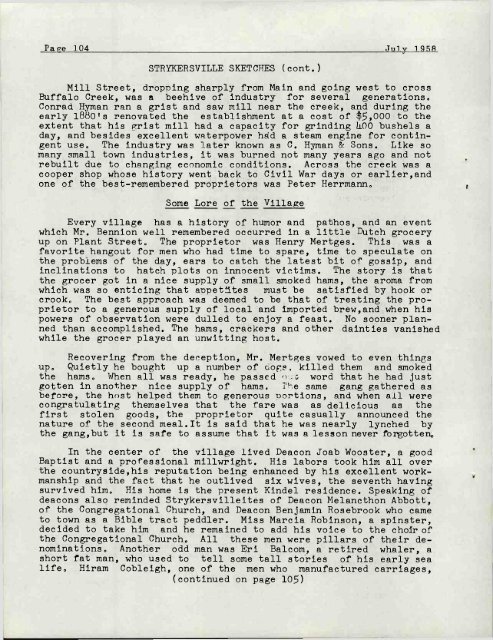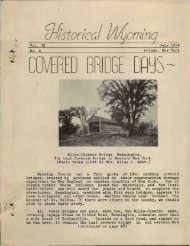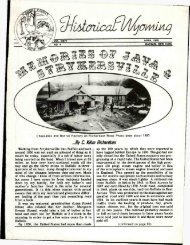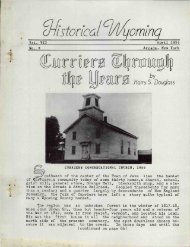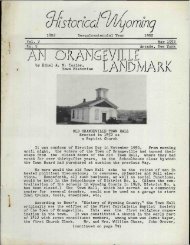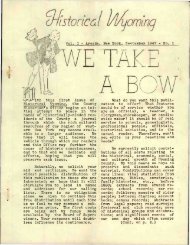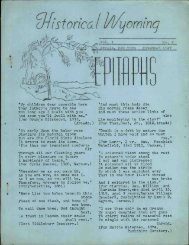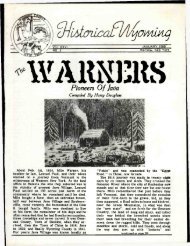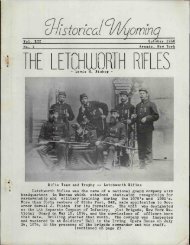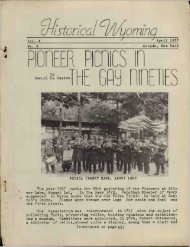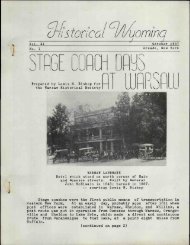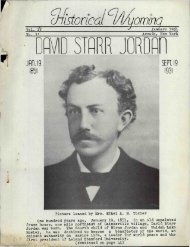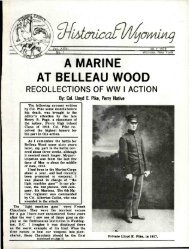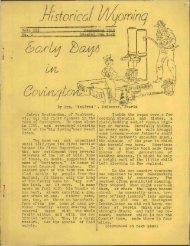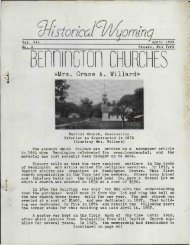Historical Wyoming County July 1958 - Old Fulton History
Historical Wyoming County July 1958 - Old Fulton History
Historical Wyoming County July 1958 - Old Fulton History
You also want an ePaper? Increase the reach of your titles
YUMPU automatically turns print PDFs into web optimized ePapers that Google loves.
Page 104 <strong>July</strong> 19 58<br />
STRYKERSVILLE SKETCHES (cont.)<br />
Mill Street, dropping sharply from Main and going west to cross<br />
Buffalo Creek, was a beehive of industry for several generations.,<br />
Conrad Hyman ran a grist and saw mill near the creek, and during the<br />
early l880«s renovated the establishment at a cost of $5,000 to the<br />
extent that his grist mill had a capacity for grinding liOO bushels a<br />
day, and besides excellent waterpower hdd a steam engine for contingent<br />
use, The Industry was later known as C. Hyman & Sons. Like so<br />
many small town industries, it was burned not many years ago and not<br />
rebuilt due to changing economic conditions. Across the creek was a<br />
cooper shop whose history went back to Civil War days or earlier,and<br />
one of the best-remembered proprietors was Peter Herrmann.<br />
Some Lore of the Village<br />
Every village has a history of humor and pathos, and an event<br />
which Mr. Bennion well remembered occurred in a little Dutch grocery<br />
up on Plant Street. The proprietor was Henry Mertges. This was a<br />
favorite hangout for men who had time to spare, time to speculate on<br />
the problems of the day, ears to catch the latest bit of gossip, and<br />
inclinations to hatch plots on innocent victims. The story is that<br />
the grocer got in a nice supply of small smoked hams, the aroma from<br />
which was so enticing that aopetfites must be satisfied by hook or<br />
crook. The best approach was deemed to be that of treating the proprietor<br />
to a generous supply of local and Imported brew,and when his<br />
powers of observation were dulled to enjoy a feast. No sooner planned<br />
than accomplished. The hams, crackers and other dainties vanished<br />
while the grocer played an unwitting host.<br />
Recovering from the deception, Mr. Mertges vowed to even things<br />
up. Quietly he bought up a number of dogs, killed them and smoked<br />
the hams. When all was ready, he passed o c word that he had just<br />
gotten in another nice supply of hams. The same gang gathered as<br />
before, the host helped them to generous Dortions, and when all were<br />
congratulating themselves that the fare was as delicious as the<br />
first stolen goods, the proprietor quite casually announced the<br />
nature of the second meal.It is said that he was nearly lynched by<br />
the gang,but it is safe to assume that it was a lesson never forgottenc<br />
In the center of the village lived Deacon Joab Wooster, a good<br />
Baptist and a professional millwright. His labors took him all over<br />
the countryside,his reputation being enhanced by his excellent workmanship<br />
and the fact that he outlived six wives, the seventh having<br />
survived him. His home is the present Kindel residence. Speaking of<br />
deacons also reminded Strykersvilleites of Deacon Melancthon Abbott,<br />
of the Congregational Church, and Deacon Benjamin Rosebrook who came<br />
to town as a Bible tract peddler. Miss Marcia Robinson, a spinster,<br />
decided to take him and he remained to add his voice to the choir of<br />
the Congregational Church. All these men were pillars of their denominations.<br />
Another odd man was Eri Balcom, a retired whaler, a<br />
short fat man, who used to tell some tall stories of his early sea<br />
life. Hiram Cobleigh, one of the men who manufactured carriages,<br />
(continued on page 105)


